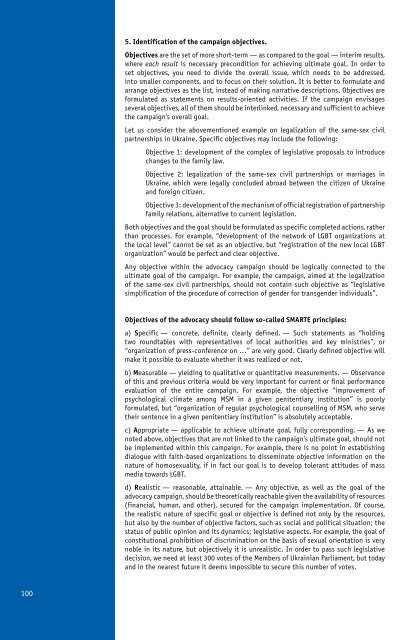Social Work with People Practicing Same-Sex ... - ILGA Europe
Social Work with People Practicing Same-Sex ... - ILGA Europe
Social Work with People Practicing Same-Sex ... - ILGA Europe
Create successful ePaper yourself
Turn your PDF publications into a flip-book with our unique Google optimized e-Paper software.
100<br />
5. Identification of the campaign objectives.<br />
Objectives are the set of more short-term — as compared to the goal — interim results,<br />
where each result is necessary precondition for achieving ultimate goal. In order to<br />
set objectives, you need to divide the overall issue, which needs to be addressed,<br />
into smaller components, and to focus on their solution. It is better to formulate and<br />
arrange objectives as the list, instead of making narrative descriptions. Objectives are<br />
formulated as statements on results-oriented activities. If the campaign envisages<br />
several objectives, all of them should be interlinked, necessary and sufficient to achieve<br />
the campaign's overall goal.<br />
Let us consider the abovementioned example on legalization of the same-sex civil<br />
partnerships in Ukraine. Specific objectives may include the following:<br />
Objective 1: development of the complex of legislative proposals to introduce<br />
changes to the family law.<br />
Objective 2: legalization of the same-sex civil partnerships or marriages in<br />
Ukraine, which were legally concluded abroad between the citizen of Ukraine<br />
and foreign citizen.<br />
Objective 3: development of the mechanism of official registration of partnership<br />
family relations, alternative to current legislation.<br />
Both objectives and the goal should be formulated as specific completed actions, rather<br />
than processes. For example, “development of the network of LGBT organizations at<br />
the local level” cannot be set as an objective, but “registration of the new local LGBT<br />
organization” would be perfect and clear objective.<br />
Any objective <strong>with</strong>in the advocacy campaign should be logically connected to the<br />
ultimate goal of the campaign. For example, the campaign, aimed at the legalization<br />
of the same-sex civil partnerships, should not contain such objective as “legislative<br />
simplification of the procedure of correction of gender for transgender individuals”.<br />
Objectives of the advocacy should follow so-called SMARTE principles:<br />
a) Specific — concrete, definite, clearly defined. — Such statements as “holding<br />
two roundtables <strong>with</strong> representatives of local authorities and key ministries”, or<br />
“organization of press-conference on …” are very good. Clearly defined objective will<br />
make it possible to evaluate whether it was realized or not.<br />
b) Measurable — yielding to qualitative or quantitative measurements. — Observance<br />
of this and previous criteria would be very important for current or final performance<br />
evaluation of the entire campaign. For example, the objective “improvement of<br />
psychological climate among MSM in a given penitentiary institution” is poorly<br />
formulated, but “organization of regular psychological counselling of MSM, who serve<br />
their sentence in a given penitentiary institution” is absolutely acceptable.<br />
c) Appropriate — applicable to achieve ultimate goal, fully corresponding. — As we<br />
noted above, objectives that are not linked to the campaign's ultimate goal, should not<br />
be implemented <strong>with</strong>in this campaign. For example, there is no point in establishing<br />
dialogue <strong>with</strong> faith-based organizations to disseminate objective information on the<br />
nature of homosexuality, if in fact our goal is to develop tolerant attitudes of mass<br />
media towards LGBT.<br />
d) Realistic — reasonable, attainable. — Any objective, as well as the goal of the<br />
advocacy campaign, should be theoretically reachable given the availability of resources<br />
(financial, human, and other), secured for the campaign implementation. Of course,<br />
the realistic nature of specific goal or objective is defined not only by the resources,<br />
but also by the number of objective factors, such as social and political situation; the<br />
status of public opinion and its dynamics; legislative aspects. For example, the goal of<br />
constitutional prohibition of discrimination on the basis of sexual orientation is very<br />
noble in its nature, but objectively it is unrealistic. In order to pass such legislative<br />
decision, we need at least 300 votes of the Members of Ukrainian Parliament, but today<br />
and in the nearest future it deems impossible to secure this number of votes.


